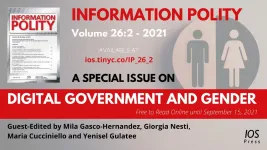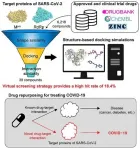Digital government needs to better take women's digital needs into account
Experts explore the persisting digital gender gap in digital government research and practice and present a vision for future research in this Special Issue of Information Polity
2021-07-08
(Press-News.org) Amsterdam, July 8, 2021 - While the literature on the digital divide has widely addressed the digital gender gap, its potential implications for electronic government (e-government) / digital government research and practice have hardly been studied. In this Special Issue of Information Polity experts characterize the current state of understanding of the issues surrounding digital government and gender and present an agenda for future research.
Gender is a neglected topic in the literature on digital government. According to the International Telecommunications Union, women are lagging behind men in making use of the Internet in almost two thirds of countries worldwide. Overall, the proportion of all women using the Internet globally is 48%, compared with 58% of all men. More men than women use the Internet in every region of the world except in the Americas, where the gender gap continues to hover around zero, and in the European Union (EU), where the percentage of men using the Internet in 2020 was around 90% percent, compared with 88% of women.
"Science, math, and quantitative fields in general have always been perceived as male fields," explained the guest co-editors. "Despite the progress made in the last few years, technology is still seen as a tool for men. A more comprehensive view on gender is needed that includes male authors discussing gender issues and that also focuses on men and the differences between men and women, but in addition to the LGBTQ collective."
"Most published studies to date have focused on adoption and use of technologies by women, but we also need deeper insights into the impact of technology on the quality of life of women," the guest co-editors remarked. "We need to collect more gender-sensitive data on the usage of digital government services in order to better understand women's needs and design services accordingly."
This Special Issue presents five articles, two book reviews, and a comparative country report that characterize the current state of understanding to raise awareness of the issues and open an opportunity to build a research agenda on digital government and gender. The articles in this issue revolve around:
The study of gender and technology in government
The use of electronic government services and implications for the digital gender gap
The gender difference in the continuance intention to e-file income tax returns in Pakistan
The use of social media as a promising communication tool by mayors in Canada, which is more accessible to women than mainstream media
A comparison of the AI policy frameworks of the European Union and Spain
The development of digital governance in Mongolia and Taiwan
A review of two books: African Women, ICT and Neoliberal Politics, by Assata Zerai, and Data Feminism, by Catherine D'Ignazio and Lauren Klein
Collectively, the articles included in this Special Issue indicate that researchers worldwide are building a consistent research agenda around the topic of digital government and gender. "The future looks hopeful," commented the guest co-editors. "Young women scholars are more and more interested in addressing these issues. There are academic organizations and groups, such as Academic Women in Public Administration, that want to address gender inequality in different fields including technology. The level of interest in this issue shows this is an important topic."
The guest co-editors provide a research agenda that they hope will form the basis for future research. They stress that there is a long way ahead and further research should be conducted in order to better understand how inequalities interact and impact women's willingness and propensity to adopt and use digital government, as well as how digital government impacts women's quality of life.
"A gender perspective should be integrated in designing public services in order to better assess women's needs and avoid gender biases especially in emerging fields such as AI and big data analysis. Future research could also focus on gender-based use of different technologies and participation in technology-based initiatives, further exploring the variation in drivers, determinants, and outcomes among social media, online participation platforms, digital co-production, and online services, to just name a few examples," the guest co-editors concluded.
INFORMATION:
[Attachments] See images for this press release:

ELSE PRESS RELEASES FROM THIS DATE:
2021-07-08
demic have already had a dramatic impact on the prevailing oral health care model and will continue to do so. The paper "Advocacy for a Digital Oral Health That Leaves No One Behind," published in the JDR Clinical & Translational Research (JDR CTR), promotes the use of digital tools to offer opportunities to improve healthy behavior, lower risk factors common to oral diseases and other noncommunicable diseases and contribute to reducing oral health inequalities.
To mitigate the impact of the COVID-19 pandemic lockdowns, systems were quickly put in place in most countries to respond to dental emergencies, ...
2021-07-08
Consuming a protein supplement, specifically protein hydrolysate, during carbohydrate-restricted training was helpful for improving training intensity in women, but not in men.
That's according to new research which will be part of a presentation this week at The Physiological Society's Annual Conference Physiology 2021.
Most nutrition guidelines for athletes are based on research in men only. This study, by Tanja Oosthuyse and her colleagues, emphasizes that this shouldn't be the case, because nutritional research findings in men don't always apply to women.
While the protein supplement helped training intensity in women, it did not improve training intensity and instead resulted in modest negative effect in men. It made exercise ...
2021-07-08
July 8, 2021 - Women with recurrent urinary tract infections (UTIs) experience frustration related to their treatment - particularly the risks from repeated use of antibiotics, according to a focus group study in The Journal of Urology®, Official Journal of the American Urological Association (AUA). The journal is published in the Lippincott portfolio by Wolters Kluwer.
"This study was prompted by our experience treating countless women with recurrent UTIs referred to our specialized Female Pelvic Medicine and Reconstructive Surgery center," comments senior author Ja-Hong Kim, MD, of UCLA Center of Women's Pelvic Health. "The vast majority were understandably dissatisfied with their care pathway, which was primarily antibiotic-focused ...
2021-07-08
Ibaraki, Japan - Most kids dream of growing up to be astronauts; but the downside of spending extended amounts of time in low gravity is that astronauts' muscles tend to shrink and weaken through disuse. Now, researchers from Japan have identified a protein that affects how muscles respond to space flight.
In a study published in June 2021 in Communications Biology, researchers from the University of Tsukuba have revealed that nuclear factor E2-related factor 2, or NRF2, helps keep muscles from becoming weak in low gravity.
Muscle atrophy, or weakening, is a common feature of disease and aging. It can also occur after a long period of inactivity, such as during space flight, when astronauts don't need to use their muscles as much as they do on Earth to support ...
2021-07-08
Thanks to the rapid development of nanotechnology, a research team led by Profs. NIE Guangjun, WU Yan and ZHAO Yuliang from the National Center for Nanoscience and Technology (NCNST) of the Chinese Academy of Sciences (CAS) recently designed personalized tumor vaccines based on bacterial cytoplasmic membranes and cell membranes from resected tumor tissue. This work was published in Science Translational Medicine.
Cancer vaccines are an effective anti-tumor therapeutic option that utilize tumor antigens to stimulate patients' immune response and specifically kill tumor cells. Postoperative recurrence and metastasis after surgery can thus be effectively inhibited by the activated immune system. Therefore, ...
2021-07-08
Quantum key distribution (QKD) is a method for secure communication that uses quantum mechanics to encrypt information. While the security of QKD is unbreakable in principle, if it is incorrectly implemented, vital information could still be stolen by attackers. These are known as side-channel attacks, where the attackers exploit weaknesses in the setup of the information system to eavesdrop on the exchange of secret keys.
Researchers from the National University of Singapore (NUS) have developed two methods, one theoretical and one experimental, to ensure that QKD communications cannot be attacked in this way. The first is an ultra-secure cryptography protocol that can be deployed in any communication network that needs long-term ...
2021-07-08
Researchers at the National Human Genome Research Institute (NHGRI), part of the National Institutes of Health (NIH), have developed the Families Sharing Health Assessment and Risk Evaluation (SHARE) workbook, which helps people use their family history to assess their risk for heart disease, diabetes, breast cancer and colorectal cancer.
Since 2012, Laura Koehly, Ph.D., and her research team have measured the accessibility and usability of the workbook by working with communities and continually updating the workbook to address issues. Koehly is the chief of the Social ...
2021-07-08
A joint research group from KAIST and Institut Pasteur Korea has identified repurposed drugs for COVID-19 treatment through virtual screening and cell-based assays. The research team suggested the strategy for virtual screening with greatly reduced false positives by incorporating pre-docking filtering based on shape similarity and post-docking filtering based on interaction similarity. This strategy will help develop therapeutic medications for COVID-19 and other antiviral diseases more rapidly. This study was reported at the Proceedings of the National Academy of Sciences of ...
2021-07-08
Washington, DC (July 6, 2021) --The International Whaling Commission (IWC) was founded to regulate whaling. Today, it also increasingly focuses on the value of live whales for planetary health. A new workshop report confirms the great ecological value of whales to help mitigate climate change, transport nutrients, enhance marine productivity, and promote biodiversity in marine ecosystems.
The world's leading experts gathered for a three-day workshop in April that was co-hosted by the IWC and the Convention on the Conservation of Migratory Species of Wild Animals (CMS). The meeting came in response to a 2016 IWC resolution, introduced by the government of Chile, to compile scientific information about the ecological roles of cetaceans (whales and dolphins).
The workshop discussions ...
2021-07-08
Researchers at the National Cerebral and Cardiovascular Center in Japan show that excessive blood pressure reduction for acute intracerebral hemorrhage is risky in people with decreased kidney function
Suita, Japan -- Stroke and chronic kidney disease are both difficult to handle in their own rights, but having a stroke when your kidneys are already poor is more than just double the trouble. A new study led by Kazunori Toyoda at the National Cerebral and Cardiovascular Center (NCVC) in Japan shows that excessive blood pressure reduction for acute intracerebral hemorrhage can have dire consequences when kidney function is low. The study was published in the scientific journal Neurology®.
Intracerebral hemorrhage is a disease for which effective treatment is expected ...
LAST 30 PRESS RELEASES:
[Press-News.org] Digital government needs to better take women's digital needs into account
Experts explore the persisting digital gender gap in digital government research and practice and present a vision for future research in this Special Issue of Information Polity



